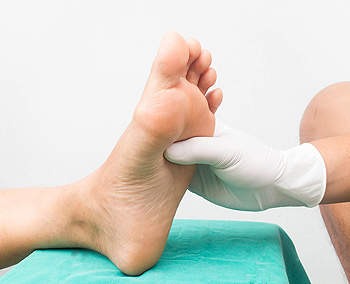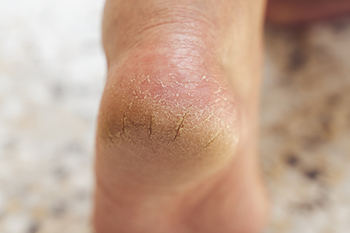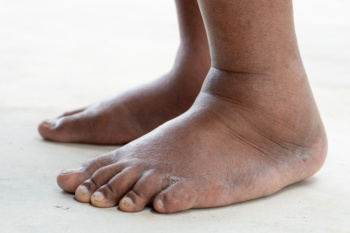Connect With Us
Blog
Items filtered by date: December 2024
Diabetic Neuropathy and the Feet

Diabetic neuropathy is a common complication of diabetes that can cause nerve damage in the feet, toes, and ankles. Elevated blood sugar levels over time can harm the peripheral nerves, leading to symptoms such as numbness, tingling, burning sensations, or sharp pain. Many people experience a gradual loss of sensation, which increases the risk of unnoticed injuries like blisters or cuts. Left untreated, these minor wounds can lead to serious infections, ulcers, and, in severe cases, gangrene or amputation. Reduced muscle strength and coordination from neuropathy may also affect balance and gait, increasing the risk of falls. To prevent complications from diabetic neuropathy, it is important to maintain proper foot care and routine foot inspections. A podiatrist can perform an exam to assess nerve function, detect early signs of problems, and provide treatment for wounds or other foot issues. This foot doctor can also offer advice on footwear to reduce pressure and prevent injury. If you are experiencing symptoms of diabetic neuropathy, it is suggested that you schedule an appointment with a podiatrist for an exam and ongoing treatment.
Neuropathy
Neuropathy can be a potentially serious condition, especially if it is left undiagnosed. If you have any concerns that you may be experiencing nerve loss in your feet, consult with Dr. Nicholas Przystawski from Central Florida Foot Care, PA. Our doctor will assess your condition and provide you with quality foot and ankle treatment for neuropathy.
What Is Neuropathy?
Neuropathy is a condition that leads to damage to the nerves in the body. Peripheral neuropathy, or neuropathy that affects your peripheral nervous system, usually occurs in the feet. Neuropathy can be triggered by a number of different causes. Such causes include diabetes, infections, cancers, disorders, and toxic substances.
Symptoms of Neuropathy Include:
- Numbness
- Sensation loss
- Prickling and tingling sensations
- Throbbing, freezing, burning pains
- Muscle weakness
Those with diabetes are at serious risk due to being unable to feel an ulcer on their feet. Diabetics usually also suffer from poor blood circulation. This can lead to the wound not healing, infections occurring, and the limb may have to be amputated.
Treatment
To treat neuropathy in the foot, podiatrists will first diagnose the cause of the neuropathy. Figuring out the underlying cause of the neuropathy will allow the podiatrist to prescribe the best treatment, whether it be caused by diabetes, toxic substance exposure, infection, etc. If the nerve has not died, then it’s possible that sensation may be able to return to the foot.
Pain medication may be issued for pain. Electrical nerve stimulation can be used to stimulate nerves. If the neuropathy is caused from pressure on the nerves, then surgery may be necessary.
If you have any questions, please feel free to contact our office located in Leesburg, FL . We offer the newest diagnostic and treatment technologies for all your foot care needs.
Understanding Diabetic Heel Fissures

Cracked heels, or heel fissures, occur when the skin surrounding the heels becomes dry, thickened, and inflamed. One common cause of cracked heels is diabetes, where poor circulation and nerve damage lead to dry skin and a higher risk of infections. Diabetic heel fissures are often more severe due to decreased sensitivity in the feet, which can prevent individuals from noticing wounds early. Other causes include prolonged standing, wearing ill-fitting shoes, or having flat feet, which increase pressure on the heels. Symptoms of cracked heels include pain, redness, swelling, and visible cracks or splits in the skin, sometimes accompanied by bleeding or infection. If you have diabetes and have developed cracked heels, it is suggested that you are under the care of a podiatrist who can offer effective relief and treatment therapies.
Cracked heels are unsightly and can cause further damage to your shoes and feet. If you have any concerns, contact Dr. Nicholas Przystawski from Central Florida Foot Care, PA. Our doctor can provide the care you need to keep you pain-free and on your feet.
Cracked Heels
Cracked heels appear unappealing and can make it harder for you walk around in sandals. Aside from looking unpleasant, cracked heels can also tear stockings, socks, and wear out your shoes. There are several methods to help restore a cracked heel and prevent further damage.
How Do You Get Them?
Dry skin is the number one culprit in creating cracked heels. Many athletes, walkers, joggers, and even swimmers suffer from cracked heels. Age and skin oil production play a role to getting cracked heels as well.
Promote Healing
Over the counter medicines can help, especially for those that need instant relief or who suffer from chronic dry feet.
Wear Socks – Wearing socks with medicated creams helps lock in moisture.
Moisturizers – Applying both day and night will help alleviate dryness which causes cracking.
Pumice Stones – These exfoliate and remove dead skin, which allows for smoother moisturizer application and better absorption into the skin.
Change in Diet
Eating healthy with a well-balanced diet will give the skin a fresh and radiant look. Your body responds to the kinds of food you ingest. Omega-3 fatty acids and zinc supplements can also revitalize skin tissue.
Most importantly, seek professional help if unsure how to proceed in treating cracked heels. A podiatrist will help you with any questions or information needed.
If you have any questions, please feel free to contact our office located in Leesburg, FL . We offer the newest diagnostic and treatment technologies for all your foot care needs.
Causes and Dangers of Swollen Feet

Swollen feet and ankles, also known as peripheral edema, occur when fluid accumulates in the tissues of the lower limbs. This condition may be caused by various factors, including extended periods of standing or sitting, excess body weight, or medical conditions like venous insufficiency, where veins struggle to pump blood effectively. Injuries or infections in the foot or ankle may also lead to swelling due to increased blood flow to the affected area. While peripheral edema is often painless, swelling that is persistent or unusual may indicate underlying issues such as blood clots, lymphedema, or certain hormonal changes. A podiatrist can evaluate the cause of swelling and rule out serious complications. This foot doctor also can recommend ways to improve circulation, manage discomfort, and prevent long-term damage to the feet, toes, and ankles. If you have unusually swollen feet or ankles, it is suggested that you schedule an appointment with a podiatrist for an exam and diagnosis.
Swollen feet can be a sign of an underlying condition. If you have any concerns, contact Dr. Nicholas Przystawski of Central Florida Foot Care, PA. Our doctor can provide the care you need to keep you pain-free and on your feet.
Swollen feet are a common ailment among pregnant women and people who stand or sit for extended periods. Aging may increase the possibility of swollen feet and patients who are obese often notice when their feet are swelling too. There may be medical reasons why swollen feet occur:
- Phlebitis - A condition that causes the veins to become inflamed and can also cause leg pain.
- Liver disease - This may lead to low blood levels of albumin which is a protein. This can cause fluid in the blood to pass into the tissues and several areas of the body can become swollen.
- Heart failure - When the heart doesn’t pump properly the blood that is normally pumped back to the heart can pool in the veins of the legs causing swollen feet.
- Kidney disease - One of the main functions of the kidneys is releasing excess fluid in the body. This type of condition can make it difficult for the kidneys to function properly, and as a result the feet may become swollen.
- Deep-vein thrombosis (DVT)- This is a serious condition where blood clots form in the veins of the legs. They can block the return of blood from the legs to the heart which may cause the feet to swell. It is important to be treated by a podiatrist if this condition is present.
Swollen feet can also be caused by bone and tendon conditions, including fractures, arthritis, and tendinitis. Additionally, there may be skin and toenail conditions and an infection may cause the feet to swell. Patients who take medicine to treat high blood pressure may be prone to getting swollen feet.
Many patients elevate their feet to help relieve the swelling and this is generally a temporary remedy. When a podiatrist is consulted the reason behind the swelling can be uncovered and subsequently treated.
If you have any questions please feel free to contact our office located in Leesburg, FL . We offer the newest diagnostic tools and technology to treat your foot and ankle needs.
Recovery From Hammertoe Surgery

Hammertoe is a deformity that causes one or more toes to bend downward at the middle joint, resembling a hammer. This condition can result from muscle imbalance, wearing tight footwear, or injury, and it often leads to pain, corns, and difficulty walking. In mild cases, hammertoe can be managed with non-surgical treatments such as proper footwear and toe exercises. However, when the condition becomes severe, surgery may be required. The surgical procedure typically involves straightening the affected toe, removing excess bone, or realigning tendons to restore normal function. Recovery from hammertoe surgery can vary depending on the severity of the deformity and the type of procedure performed. Generally, patients are advised to rest, avoid putting weight on the foot, and wear special shoes during the healing process. Full recovery may take several weeks, but with proper care, the toe can regain proper alignment and function. If you have a painful hammertoe, it is suggested that you consult a podiatrist who can determine if surgery is a correct treatment option for you.
Foot surgery is sometimes necessary to treat a foot ailment. To learn more, contact Dr. Nicholas Przystawski of Central Florida Foot Care, PA. Our doctor will assist you with all of your foot and ankle needs.
When Is Surgery Necessary?
Foot and ankle surgery is generally reserved for cases in which less invasive, conservative procedures have failed to alleviate the problem. Some of the cases in which surgery may be necessary include:
- Removing foot deformities like bunions and bone spurs
- Severe arthritis that has caused bone issues
- Cosmetic reconstruction
What Types of Surgery Are There?
The type of surgery you receive will depend on the nature of the problem you have. Some of the possible surgeries include:
- Bunionectomy for painful bunions
- Surgical fusion for realignment of bones
- Neuropathy decompression surgery to treat nerve damage
Benefits of Surgery
Although surgery is usually a last resort, it can provide more complete pain relief compared to non-surgical methods and may allow you to finally resume full activity.
Surgical techniques have also become increasingly sophisticated. Techniques like endoscopic surgery allow for smaller incisions and faster recovery times.
If you have any questions please feel free to contact our office located in Leesburg, FL . We offer the newest diagnostic and treatment technologies for all your foot and ankle needs.
Are You Suffering From Ingrown Toenails?
Gout and Effective Relief Methods

Gout is a type of arthritis that occurs when uric acid builds up in the bloodstream, forming crystals that deposit in joints, particularly in the ankle and big toe. This condition causes sudden, severe pain, redness, swelling, and tenderness in the affected joints. Gout attacks can be triggered by consuming foods high in purines, dehydration, or alcohol consumption. Managing gout involves both immediate relief and long-term strategies. During an attack, anti-inflammatory medications, such as nonsteroidal anti-inflammatory drugs, or NSAIDs, may help to reduce pain and swelling. Resting and elevating the affected joint also helps alleviate discomfort. To prevent future flare-ups, maintaining a healthy diet low in purine-rich foods, drinking plenty of water, and managing stress are essential. Gout can cause intense pain and discomfort, and it can be difficult to complete daily activities. If you have had one or more gout attacks, it is suggested that you are under the care of a podiatrist who can effectively treat gout.
Gout is a foot condition that requires certain treatment and care. If you are seeking treatment, contact Dr. Nicholas Przystawski from Central Florida Foot Care, PA. Our doctor will treat your foot and ankle needs.
What Is Gout?
Gout is a type of arthritis caused by a buildup of uric acid in the bloodstream. It often develops in the foot, especially the big toe area, although it can manifest in other parts of the body as well. Gout can make walking and standing very painful and is especially common in diabetics and the obese.
People typically get gout because of a poor diet. Genetic predisposition is also a factor. The children of parents who have had gout frequently have a chance of developing it themselves.
Gout can easily be identified by redness and inflammation of the big toe and the surrounding areas of the foot. Other symptoms include extreme fatigue, joint pain, and running high fevers. Sometimes corticosteroid drugs can be prescribed to treat gout, but the best way to combat this disease is to get more exercise and eat a better diet.
If you have any questions please feel free to contact our office located in Leesburg, FL . We offer the newest diagnostic and treatment technologies for all your foot and ankle needs.

